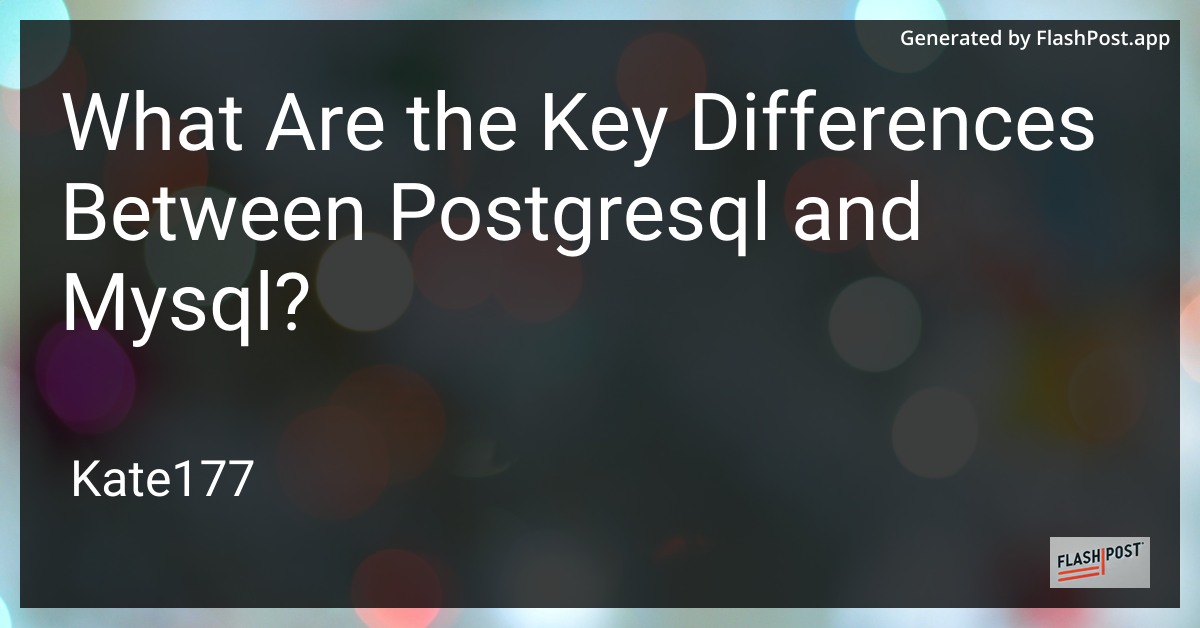
In the realm of databases, two giants stand out: PostgreSQL and MySQL. Both are open-source relational database management systems (RDBMS) that have won the trust of developers and businesses worldwide. However, they cater to different needs and preferences. In this article, we will explore the key differences between PostgreSQL and MySQL to help you make an informed decision when choosing a database for your applications.
Introduction to PostgreSQL and MySQL
PostgreSQL
PostgreSQL is an advanced, enterprise-class open-source database known for its emphasis on extensibility and standards compliance. It supports complex queries, extensive data types, and advanced performance optimization techniques.
- Learn more about PostgreSQL database creation.
- Discover how to perform a PostgreSQL database backup.
- Understand how to share your PostgreSQL database.
MySQL
MySQL is a popular choice for web applications and is renowned for its performance, reliability, and ease of use. It has been widely adopted by large-scale web-based solutions and startups alike.
Key Differences
1. Transaction Handling
- PostgreSQL: Known for its full ACID (Atomicity, Consistency, Isolation, Durability) compliance, making it ideal for systems where data integrity and complex transactions are critical.
- MySQL: While MySQL does support ACID transactions, it can depend on the storage engine in use, such as InnoDB for ACID compliance.
2. Extensibility
- PostgreSQL: Highly extensible and supports custom data types, custom functions, and more. It allows developers to add new functionalities easily.
- MySQL: Extensible to a certain extent but not as customizable as PostgreSQL.
3. Data Integrity
- PostgreSQL: Offers robust support for foreign keys and constraints, ensuring data integrity across complex relationships.
- MySQL: While providing foreign key support, it is sometimes considered less strict in maintaining data integrity.
4. SQL Compliance and Features
- PostgreSQL: Known for its strong adherence to SQL standards, offering advanced features such as window functions, common table expressions, and full-text search.
- MySQL: While it supports most SQL standards, it lacks some advanced features present in PostgreSQL.
5. Performance and Concurrency
- PostgreSQL: Utilizes MVCC (Multi-Version Concurrency Control) to handle concurrent transactions efficiently. It may offer better performance in environments requiring high concurrency.
- MySQL: Generally faster for read-heavy workloads but can struggle with complex write operations compared to PostgreSQL.
Conclusion
Choosing between PostgreSQL and MySQL ultimately depends on your specific requirements. If your application demands advanced SQL features, complex transactions, and high standards compliance, PostgreSQL might be the way to go. However, if you need a reliable, fast, and easy-to-use database for web applications, the simplicity of MySQL may serve you well.
- Further exploration of PostgreSQL database tools and methods.
- Learn about data manipulation like concatenating tables in PostgreSQL.
Understanding these differences will assist you in making a more educated decision as you design, develop, and deploy your applications.